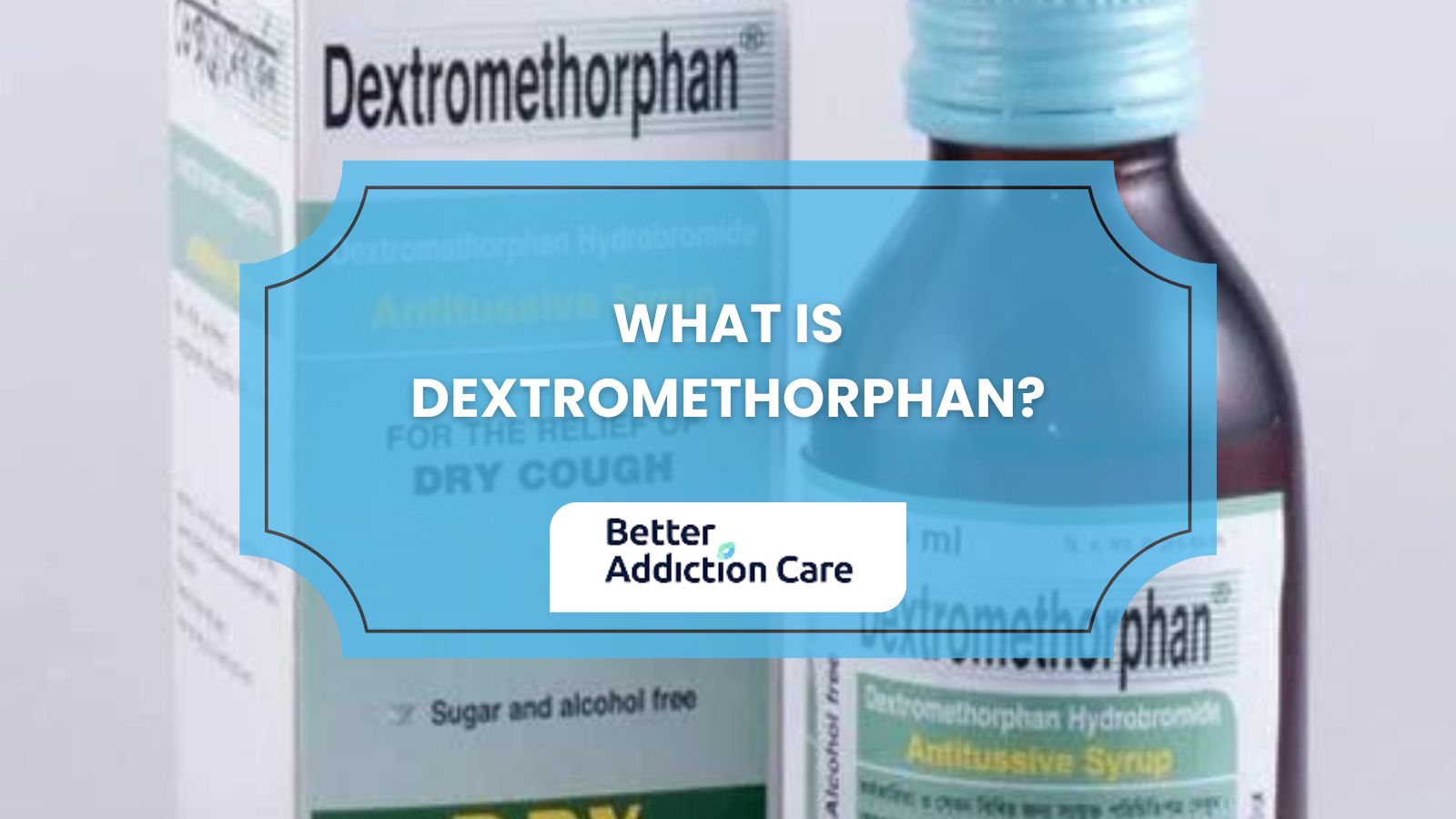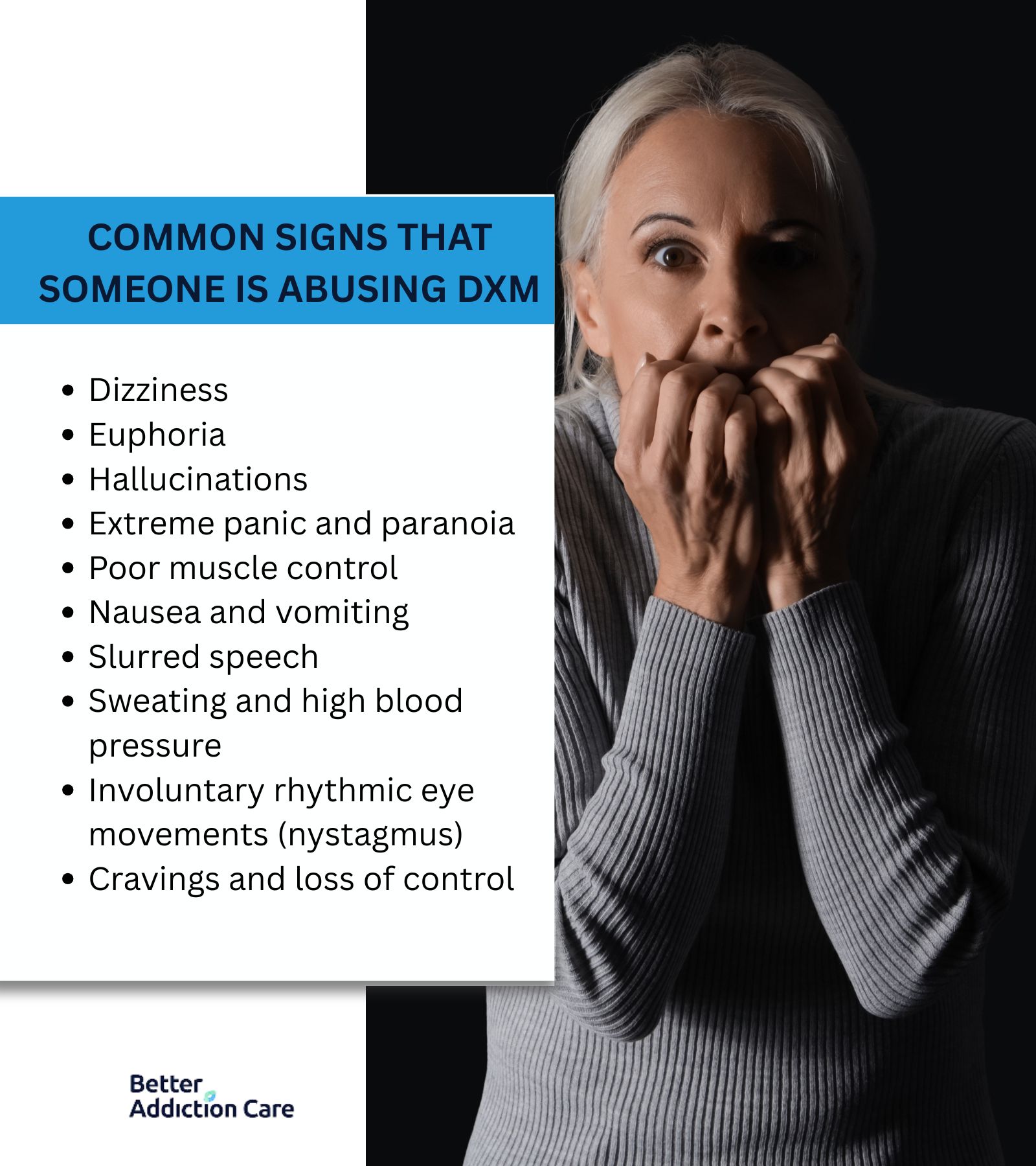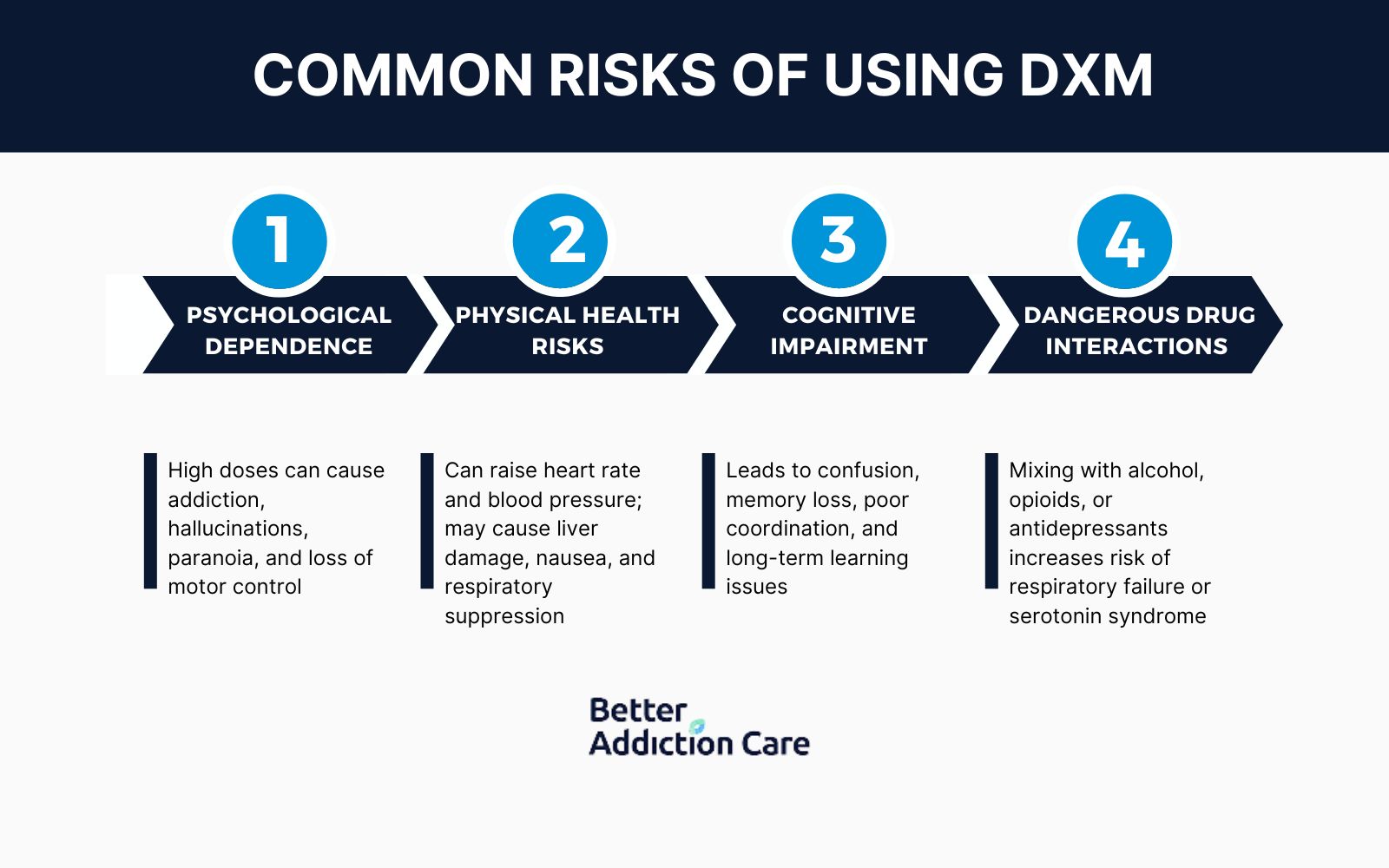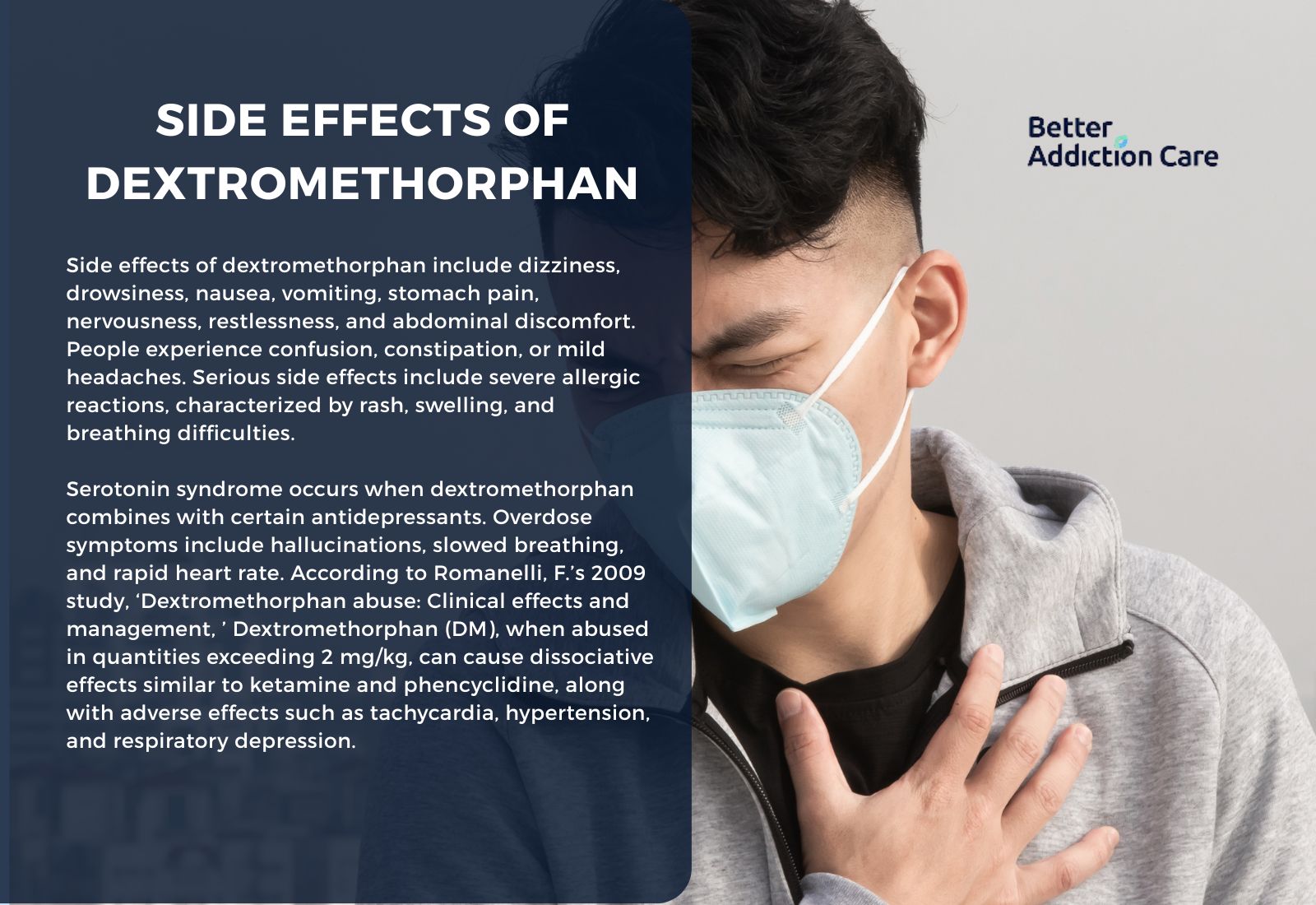What is Dextromethorphan?
Dextromethorphan is a cough suppressant (antitussive) found in over 120 over-the-counter (OTC) cold medications, including brands like Robitussin and Delsym. It acts on your brain’s cough reflex signals to reduce dry coughs caused by colds, flu, or other conditions.

Approved by the FDA in 1958, Dextromethorphan temporarily alleviates coughing but does not treat underlying illnesses. Dextromethorphan abuse has been a concern due to its psychoactive effects at high doses.
According to the National Institute on Drug Abuse, 5.4% of 8th, 10th, and 12th graders reported abusing dextromethorphan in 2006. By 2015, abuse rates dropped by 35%, with 8th graders decreasing from 3.2% to 1.6%, 10th graders from 5.1% to 3.3%, and 12th graders from 6.6% to 4.6%.
What is Dextromethorphan (DXM) and How Does It Work?
Dextromethorphan is a cough suppressant used in several over-the-counter cold and cough medications. It works by acting on your brain to suppress the urge to cough, relieving you from symptoms associated with colds, the flu, and other respiratory diseases. DXM is a popular ingredient in many household cough and cold medicines, available in various forms such as syrups, tablets, and lozenges.
Dextromethorphan (DXM) works by acting on the brain's NMDA receptors, serotonin and noradrenaline transporters, and sigma-1 receptors, suppressing cough reflexes and altering neurotransmitter activity, which leads to psychoactive effects when abused.
According to Gupta, L.’s 2024 study, ‘Dextromethorphan: A double-edged drug – Unveiling the pernicious repercussions of Abuse and forensic implications’, DXM primarily suppresses cough reflexes by directly acting on brain signals. It interacts with serotonin transporters, noradrenaline transporters, nicotinic acetylcholine receptors, AMPA receptors, and sigma-1 receptors, altering neurotransmitter activity. Its major metabolite, dextrorphan, acts as a non-competitive NMDA receptor antagonist, which decreases catecholamine and serotonin reuptake. This mechanism is a significant factor in its abuse potential, as it can induce dissociative effects such as hallucinations and detachment from sight and sound perceptions. DXM is rapidly absorbed in the gastrointestinal tract and metabolized in the liver, allowing it to cross the blood-brain barrier and exert its effects on the central nervous system. These properties make it effective as a cough suppressant, but also contribute to its misuse and dependency risks.
When is Dextromethorphan (DXM) Indicated?
Dextromethorphan (DXM) is primarily indicated for suppressing coughs caused by upper respiratory tract infections such as the common cold and flu. It is indicated in cases of acute cough when there's a need to reduce the cough reflex in the brain, thereby relieving discomfort from persistent coughing. DXM is sometimes indicated for treating chronic cough conditions like bronchitis or chronic obstructive pulmonary disease (COPD), though these applications typically require medical supervision.
Beyond cough suppression, DXM is indicated in combination with quinidine for the treatment of pseudobulbar affect (PBA), a neurological condition characterized by uncontrollable episodes of crying or laughing. In this application, the drug combination helps reduce the frequency and severity of emotional outbursts. Ongoing research suggests DXM is potentially indicated for certain types of neuropathic pain due to its effects on NMDA receptors, though such uses remain largely investigational and require medical oversight.
In experimental settings, DXM is being studied for depression and migraine treatment based on its interactions with serotonin and other neurotransmitters, although these applications have not yet been widely adopted in standard clinical practice.
According to Pompili, M.’s 2025 study, ‘Can dextromethorphan-bupropion reduce mental pain in depressed individuals? A hypothesis-generating overview perspective. Dextromethorphan, in combination with bupropion, is a rapid-acting treatment for major depressive disorder that targets the opioid system to reduce mental pain and improve outcomes in patients with treatment-resistant depression. This approach aligns with Panksepp’s emotional theory, which links the opioid system to emotional regulation and grief processing.
What Are The Signs That Someone Is Abusing DXM?

The signs that someone is abusing DXM include dizziness, euphoria, hallucinations, extreme anxiety, impaired coordination, gastrointestinal distress, unclear speech, excessive sweating, involuntary eye movements, and addictive behaviors.
Here are the common signs that someone is abusing DXM:
-
Dizziness: Dizziness is a common sign of DXM abuse, often resulting from its effects on the central nervous system, causing imbalance and lightheadedness.
-
Euphoria: Euphoria refers to intense feelings of happiness or pleasure, driven by DXM’s psychoactive effects that contribute to its misuse.
-
Hallucinations: Hallucinations involve visual or auditory distortions, such as seeing or hearing things that are not present, particularly at higher doses. According to Okamoto, K.’s 2025 study, ‘Dextromethorphan-induced serotonin syndrome leading to rhabdomyolysis and dialysis-requiring acute kidney injury: a case report and review, ’ dextromethorphan (DXM) has gained popularity among young people for its euphoric and hallucinogenic effects. High doses lead to severe serotonin syndrome with life-threatening complications, as demonstrated in a patient who required dialysis after consuming 1800 mg.
-
Extreme Panic and Paranoia: Extreme panic and paranoia manifest as severe anxiety, panic attacks, and irrational distrust, affecting mental stability.
-
Poor Muscle Control: Poor muscle control results in loss of coordination, clumsiness, or difficulty walking due to impaired motor function.
-
Nausea and Vomiting: Nausea and vomiting are gastrointestinal symptoms often accompanying DXM abuse and overdose. According to Chyka, P. A.’s 2007 study, ‘Dextromethorphan poisoning: An evidence-based consensus guideline for out-of-hospital management’, infrequent vomiting occurs as a mild symptom after acute dextromethorphan ingestion. Dextromethorphan ingestion at 5-7.5 mg/kg requires poison center follow-up every 2 hours for up to 4 hours post-ingestion. Doses exceeding 7.5 mg/kg necessitate immediate emergency department evaluation.
-
Slurred Speech: Slurred speech occurs when speech becomes slow, unclear, or difficult to understand due to impaired motor function.
-
Sweating and high blood pressure: Physical symptoms such as excessive sweating and elevated blood pressure can occur as the body reacts to the drug.
-
Involuntary Rhythmic Eye Movements (Nystagmus): Involuntary rhythmic eye movements, or nystagmus, are neurological signs of DXM intoxication or overdose.
-
Cravings and loss of control: Repeated use despite negative consequences, increased tolerance, and spending significant time obtaining or recovering from DXM use indicate addiction.
What Are The Risks of Using DXM?

The risks of using DXM include psychological dependence, physical health complications, neurological impairment, and dangerous drug interactions. High doses can produce dissociative effects, hallucinations, and loss of motor control, while physical dangers encompass elevated heart rate, blood pressure issues, and respiratory suppression.
Here are the common risks of using DXM:
-
Misuse and Psychological Dependence: At high doses, DXM acts as an NMDA receptor blocker, producing dissociative and hallucinogenic effects. These effects lead to psychological dependence and compulsive use over time. Hallucinations, paranoia, agitation, and loss of motor control are common outcomes of excessive consumption.
-
Physical Health Hazards: Increased heart rate and elevated blood pressure occur with DXM misuse. Respiratory suppression becomes severe when combined with CNS depressants like alcohol or opioids. Acetaminophen-containing DXM products increase the risk of liver damage, while nausea and vomiting are frequent gastrointestinal effects.
-
Neurological and Cognitive Risks: Impaired coordination, confusion, and dizziness result from DXM misuse. Long-term cognitive deficits include memory loss and reduced learning ability. Serotonin syndrome manifests as hyperthermia, muscle rigidity, and seizures when DXM interacts with serotonergic drugs. According to Carter, L. P.’s 2013 study, ‘Acute cognitive effects of high doses of dextromethorphan relative to triazolam in humans’, dextromethorphan (DXM) in supratherapeutic doses (above 300 mg/70 kg) results in acute impairments in attention, working memory, episodic memory, and metacognition. The administration of recreational doses, which often exceed 600-900 mg/70 kg, produces cognitive impairments on all tasks that were examined, with these doses being 10-30 times higher than the therapeutic dose range of 10-30 mg.
-
Drug Interactions: Combining DXM with CNS depressants like alcohol or benzodiazepines increases the risk of respiratory failure. Mixing DXM with serotonergic medications heightens the likelihood of serotonin syndrome, a potentially fatal condition.
What Are The Side Effects Of Dextromethorphan?

Side effects of dextromethorphan include dizziness, drowsiness, nausea, vomiting, stomach pain, nervousness, restlessness, and abdominal discomfort. People experience confusion, constipation, or mild headaches. Serious side effects include severe allergic reactions, characterized by rash, swelling, and breathing difficulties.
Serotonin syndrome occurs when dextromethorphan combines with certain antidepressants. Overdose symptoms include hallucinations, slowed breathing, and rapid heart rate. According to Romanelli, F.’s 2009 study, ‘Dextromethorphan abuse: Clinical effects and management, ’ Dextromethorphan (DM), when abused in quantities exceeding 2 mg/kg, can cause dissociative effects similar to ketamine and phencyclidine, along with adverse effects such as tachycardia, hypertension, and respiratory depression.
If you experience severe symptoms or allergic reactions, immediate medical attention is necessary.
How To Recover from DXM Dependence?
To recover from DXM dependence, you need a comprehensive approach that addresses both physical and psychological aspects. Start by consulting an addiction medicine professional who evaluates your situation and recommends a suitable drug detox program or therapy. Recovery requires patience, commitment, and ongoing support.
According to Journey, J. D.’s 2023 study, ‘Dextromethorphan toxicity’, Treatment often includes sedation with benzodiazepines like Lorazepam (2-4mg IV/IM), which helps control agitation and psychosis. Gastrointestinal decontamination with activated charcoal proves most effective when administered within one hour of ingestion. Naloxone effectively treats respiratory depression at doses of 0.1mg/kg (maximum 2mg IV).
Patients experiencing hyperthermia need active cooling measures, including evaporative cooling and cold IV fluids. Those experiencing complications such as seizures, hypertensive crisis, serotonin syndrome, or rhabdomyolysis require ICU admission. Asymptomatic patients without suicidal ideation and negative acetaminophen levels receive discharge after six hours of observation. For intentional overdoses, psychiatric consultation becomes essential for comprehensive recovery and prevention of future incidents.
How Can Local Drug Rehab Facilities Help With Dextromethorphan Dependence?
Local drug rehab facilities provide you with structured treatment programs, medical supervision, and behavioral therapies to effectively address dextromethorphan dependence.
Dextromethorphan dependence necessitates professional intervention to help you manage withdrawal symptoms, identify underlying triggers, and prevent relapse. Rehab centers offer you tailored plans that include detoxification, counseling, and aftercare support to promote your long-term recovery.
These local drug rehab facilities combine evidence-based therapies like cognitive-behavioral therapy (CBT) with holistic approaches such as mindfulness and group sessions to ensure comprehensive care. We help you find a supportive environment where patients learn coping strategies and life skills essential for sobriety.
Related Articles
Treatment Centers in Texas






